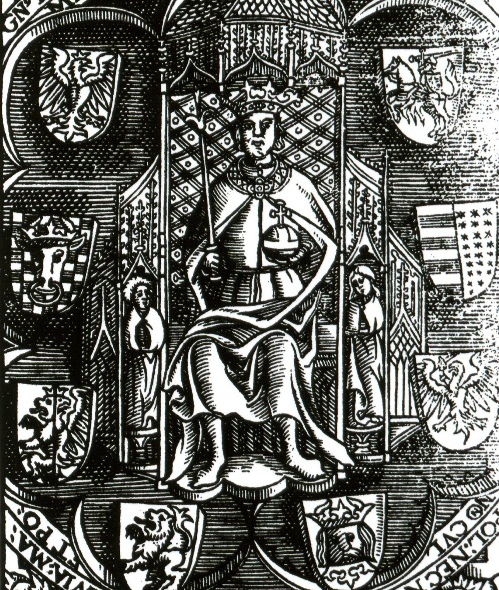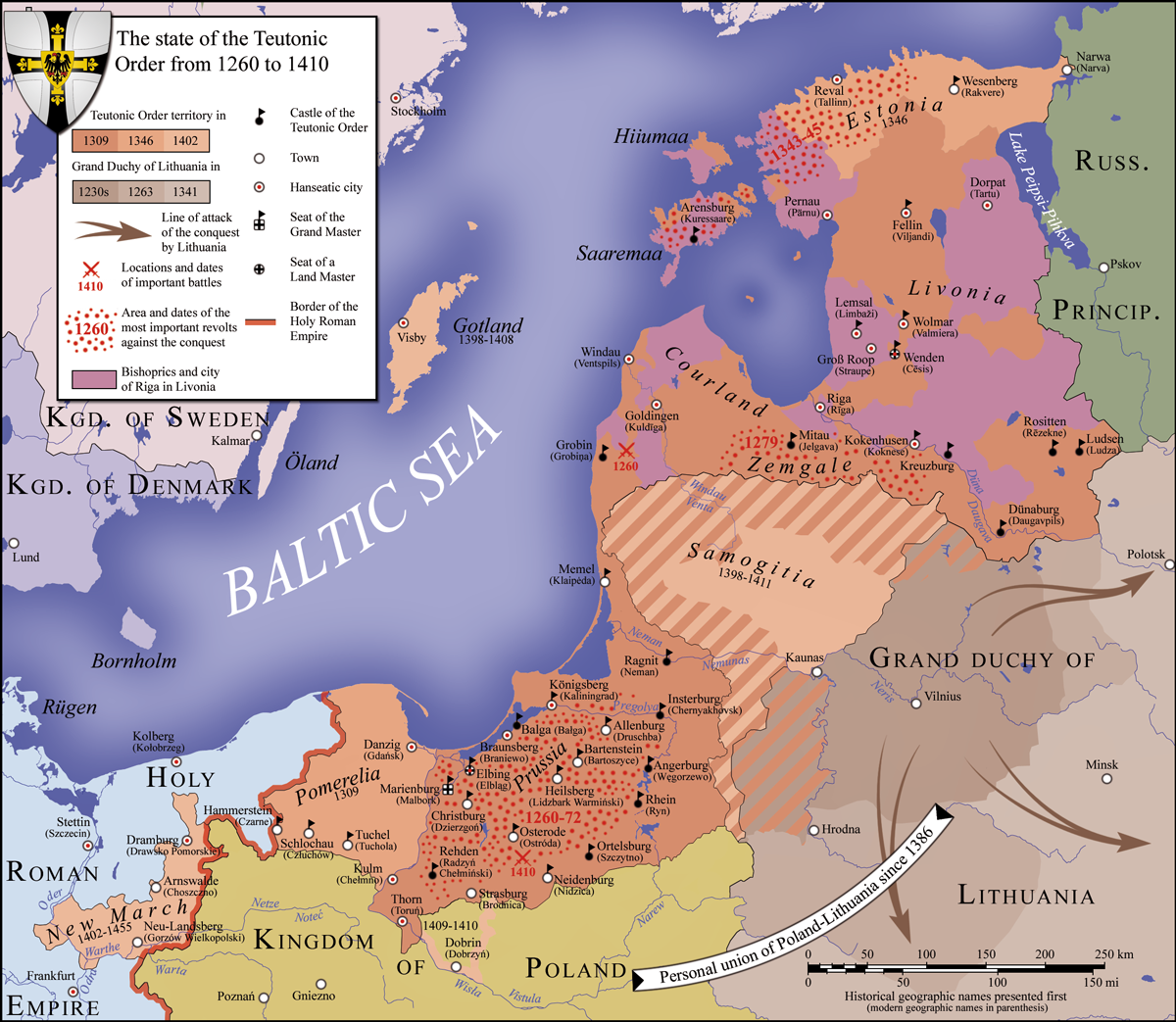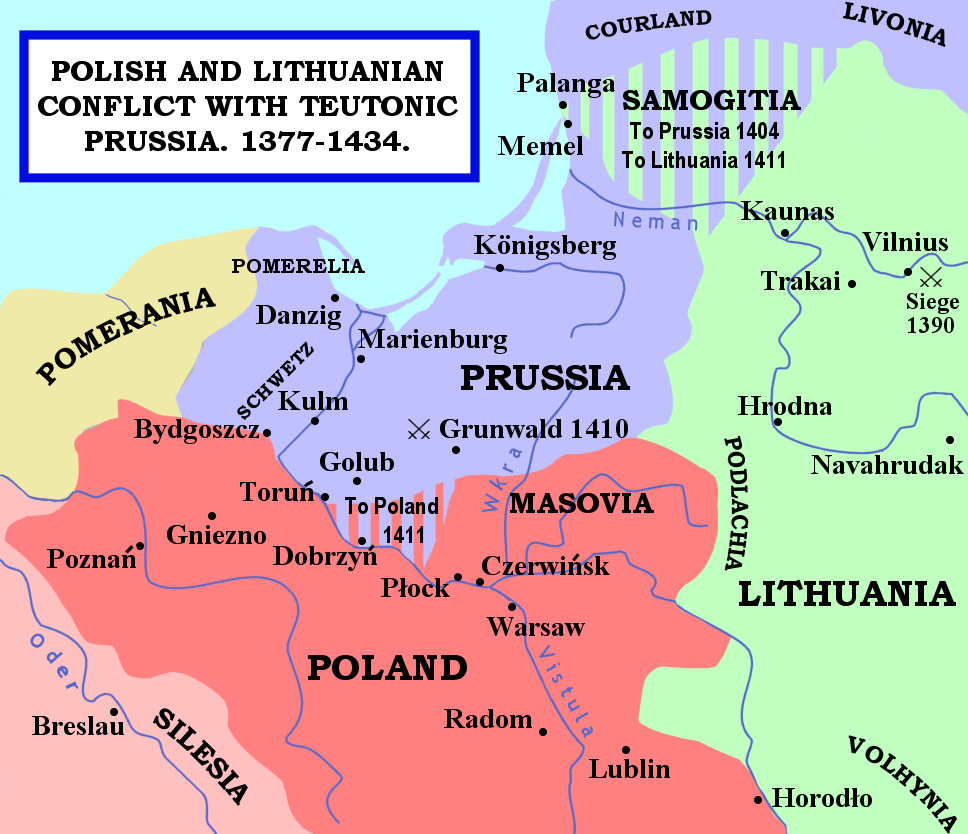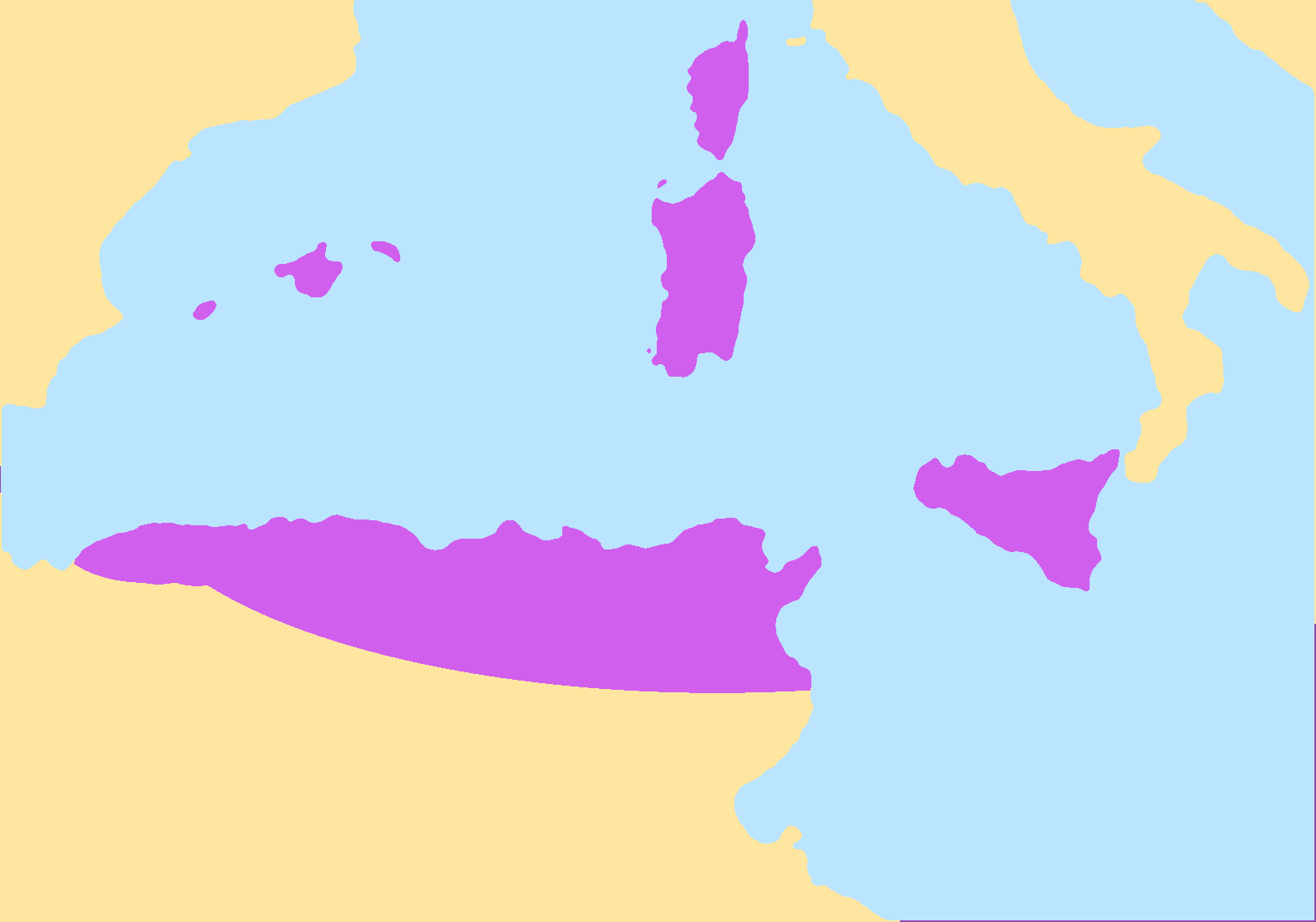|
Gronowo Elbląskie
Gronowo Elbląskie is a village in Elbląg County, Warmian-Masurian Voivodeship, in northern Poland. It is the seat of the gmina (administrative district) called Gmina Gronowo Elbląskie. It lies approximately west of Elbląg and north-west of the regional capital Olsztyn. History Human settlement dates back to ancient times. Ancient Roman coins from the time of Emperors Theodosius II, Valentinian III, Leo I and Libius Severus have been discovered in the village. The oldest known location privilege of the village dates back to 1365. In 1410, Polish King Władysław II Jagiełło granted the village to the New Town of Elbląg as a reward for its support against the Teutonic Knights in the Polish–Lithuanian–Teutonic War. During the Thirteen Years' War, in 1457, King Casimir IV Jagiellon granted the village to the Old Town of Elbląg, which led to a long dispute between the Old and New Towns over the village, however, it effectively remained under the administration of the ... [...More Info...] [...Related Items...] OR: [Wikipedia] [Google] [Baidu] |
List Of Sovereign States
The following is a list providing an overview of sovereign states around the world with information on their status and recognition of their sovereignty. The 205 listed states can be divided into three categories based on membership within the United Nations System: 193 member states of the United Nations, UN member states, two United Nations General Assembly observers#Current non-member observers, UN General Assembly non-member observer states, and ten other states. The ''sovereignty dispute'' column indicates states having undisputed sovereignty (188 states, of which there are 187 UN member states and one UN General Assembly non-member observer state), states having disputed sovereignty (15 states, of which there are six UN member states, one UN General Assembly non-member observer state, and eight de facto states), and states having a political status of the Cook Islands and Niue, special political status (two states, both in associated state, free association with New ... [...More Info...] [...Related Items...] OR: [Wikipedia] [Google] [Baidu] |
Roman Empire
The Roman Empire ruled the Mediterranean and much of Europe, Western Asia and North Africa. The Roman people, Romans conquered most of this during the Roman Republic, Republic, and it was ruled by emperors following Octavian's assumption of effective sole rule in 27 BC. The Western Roman Empire, western empire collapsed in 476 AD, but the Byzantine Empire, eastern empire lasted until the fall of Constantinople in 1453. By 100 BC, the city of Rome had expanded its rule from the Italian peninsula to most of the Mediterranean Sea, Mediterranean and beyond. However, it was severely destabilised by List of Roman civil wars and revolts, civil wars and political conflicts, which culminated in the Wars of Augustus, victory of Octavian over Mark Antony and Cleopatra at the Battle of Actium in 31 BC, and the subsequent conquest of the Ptolemaic Kingdom in Egypt. In 27 BC, the Roman Senate granted Octavian overarching military power () and the new title of ''Augustus (title), Augustus'' ... [...More Info...] [...Related Items...] OR: [Wikipedia] [Google] [Baidu] |
Association Football
Association football, more commonly known as football or soccer, is a team sport played between two teams of 11 Football player, players who almost exclusively use their feet to propel a Ball (association football), ball around a rectangular field called a Football pitch, pitch. The objective of the game is to Scoring in association football, score more goals than the opposing team by moving the ball beyond the goal line into a rectangular-framed Goal (sport), goal defended by the opposing team. Traditionally, the game has been played over two 45-minute halves, for a total match time of 90 minutes. With an estimated 250 million players active in over 200 countries and territories, it is the world's most popular sport. Association football is played in accordance with the Laws of the Game (association football), Laws of the Game, a set of rules that has been in effect since 1863 and maintained by the International Football Association Board, IFAB since 1886. The game is pla ... [...More Info...] [...Related Items...] OR: [Wikipedia] [Google] [Baidu] |
Casimir IV Jagiellon
Casimir IV (Casimir Andrew Jagiellon; ; Lithuanian: ; 30 November 1427 – 7 June 1492) was Grand Duke of Lithuania from 1440 and King of Poland from 1447 until his death in 1492. He was one of the most active Polish-Lithuanian rulers; under him, Poland defeated the Teutonic Knights in the Thirteen Years' War and recovered Pomerania. The Jagiellonian dynasty became one of the leading royal houses in Europe. The great triumph of his reign was bringing Prussia under Polish rule. The rule of Casimir corresponded to the age of "new monarchies" in western Europe. By the 15th century, Poland had narrowed the distance separating it from Western Europe and became a significant power in international relations. The demand for raw materials and semi-finished goods stimulated trade, producing a positive balance, and contributed to the growth of crafts and mining in the entire country. He was a recipient of the English Order of the Garter (KG), the highest order of chivalry and the most ... [...More Info...] [...Related Items...] OR: [Wikipedia] [Google] [Baidu] |
Thirteen Years' War (1454–1466)
The Thirteen Years' War (; ), also called the War of the Cities, was a conflict fought in 1454–1466 between the Crown of the Kingdom of Poland and the Teutonic Order. After the Battle of Grunwald, enormous defeat suffered by the German Order at the hand of Poland-Lithuania in 1410 and the ensuing political, military and economic problems, the state was rife with internal conflict between the ruling Order and the Old Prussians, native Prussian warlords, who shared concerns with assimilated Prussian and German townsfolk. Eventually this tension led to an uprising by the Prussian Confederation representing the local Prussian nobility and cities, who sought the protection of the Polish King Casimir IV Jagiellon. This essentially amounted to a switching of sides which the German Order immediately took as a mortal threat, and a war broke out between Poland and the Teutons. The Thirteen Years' War ended in the victory of Poland and in the Second Peace of Thorn (1466), Second Peace ... [...More Info...] [...Related Items...] OR: [Wikipedia] [Google] [Baidu] |
Polish–Lithuanian–Teutonic War
The Polish–Lithuanian — Teutonic War, also known as the Great Teutonic War, occurred between 1409 and 1411 between the Teutonic Knights and the allied History of Poland (1385–1569), Kingdom of Poland and Grand Duchy of Lithuania. Inspired by the local Samogitian uprising, the war began with a Teutonic invasion of Poland in August 1409. As neither side was ready for a full-scale war, Wenceslaus IV of Bohemia brokered a nine-month truce. After the truce expired in June 1410, the military-religious monks were decisively defeated in the Battle of Grunwald, one of the largest battles in medieval Europe. Most of the Teutonic leadership was killed or taken prisoner. Although they were defeated, the Teutonic Knights Siege of Marienburg (1410), withstood the siege on their capital in Marienburg (Malbork) and suffered only minimal territorial losses in the Peace of Thorn (1411). Territorial disputes lasted until the Peace of Melno of 1422. However, the Knights never recovered their ... [...More Info...] [...Related Items...] OR: [Wikipedia] [Google] [Baidu] |
Władysław II Jagiełło
Jogaila (; 1 June 1434), later Władysław II Jagiełło (),Other names include (; ) (see also Names and titles of Władysław II Jagiełło) was Grand Duke of Lithuania beginning in 1377 and starting in 1386, becoming King of Poland as well. As Grand Duke, he ruled Lithuania from 1377 to 1381 and from 1382 to 1401, at which time he became the Supreme Duke of Lithuania in exchange for naming his cousin Vytautas as the new Grand Duke. Władysław II initially served as King of Poland alongside his wife Jadwiga of Poland, Jadwiga until her death in 1399, and then the sole ruler until his own death in 1434. Raised a Lithuanian polytheist, he converted to Catholicism in 1386 and baptized as Ladislaus () in Kraków, married the young Queen Jadwiga, and was crowned King of Poland as Władysław II Jagiełło. In 1387, he Christianization of Lithuania, converted Lithuania to Catholicism. His reign in Poland started in 1399, upon the death of Queen Jadwiga, lasted a further thirty-fiv ... [...More Info...] [...Related Items...] OR: [Wikipedia] [Google] [Baidu] |
Privilege (law)
A privilege is a certain entitlement to immunity from prosecution, immunity granted by the state or another authority to a restricted group, either by birth or on a conditional basis. Land-titles and taxi medallions are examples of transferable privilege – they can be revoked in certain circumstances. In modern democratic states, a ''privilege'' is conditional and granted only after birth. By contrast, a ''right'' is an inherent, irrevocable entitlement held by all citizens or all human beings from the moment of birth. Various examples of old common law privilege still exist – to title deeds, for example. Etymologically, a privilege (''privilegium'') means a "private law", or rule relating to a specific individual or institution. The principles of conduct that members of the legal profession observe in their practice are called legal ethics. Boniface's Fulda monastery, abbey of Fulda, to cite an early and prominent example, was granted ''privilege (canon law), privilegium' ... [...More Info...] [...Related Items...] OR: [Wikipedia] [Google] [Baidu] |
Libius Severus
Libius Severus, sometimes enumerated as Severus III, was Western Roman Empire, Western Roman emperor from November 19, 461 to his death on November 14, 465. A native of Lucania,Cassiodorus, ''Chronicle''; ''Chronica Gallica of 511'', s:la:Chronica gallica a. dxi#636, 636. Severus was the fourth of the so-called "Shadow Emperors" who followed the deposition of the Valentinianic dynasty in 455. He ruled for just under four years, attaining the throne after his predecessor, Majorian, was overthrown by his ''magister militum'', Ricimer. Severus was the first of a series of emperors who were highly dependent on the general, and it is often presumed that Ricimer held most of the ''de facto'' power during Severus' reign Severus' reign was marked by diplomatic tension and an erosion of Rome's control over the non-Italian provinces. Diplomatically, Severus failed to secure the Byzantine Empire, eastern emperor Leo I (emperor), Leo's recognition, and the alliance Majorian had made with Van ... [...More Info...] [...Related Items...] OR: [Wikipedia] [Google] [Baidu] |
Leo I (emperor)
Leo I (; 401 – 18 January 474), also known as "the Thracian" (; ), was Eastern Roman emperor from 457 to 474. He was a native of Dacia Aureliana near historic Thrace. He is sometimes surnamed with the epithet "the Great" (; ), probably to distinguish him from his young grandson and co-''augustus'' Leo II (). During his 17-year rule, he oversaw a number of ambitious political and military plans, aimed mostly at aiding the faltering Western Roman Empire and recovering its former territories. He is notable for being the first Eastern Emperor to legislate in Koine Greek rather than Late Latin. He is commemorated as a saint in the Eastern Orthodox Church, with his feast day on 20 January. Reign He was born in Thracia or in Dacia Aureliana province in the year 401 to a Thraco-Roman family. His Dacian origin is mentioned by Candidus Isaurus, while John Malalas believes that he was of Bessian Thracian stock. According to the '' Patria of Constantinople'' he had one siste ... [...More Info...] [...Related Items...] OR: [Wikipedia] [Google] [Baidu] |
Valentinian III
Valentinian III (; 2 July 41916 March 455) was Roman emperor in the Western Roman Empire, West from 425 to 455. Starting in childhood, his reign over the Roman Empire was one of the longest, but was dominated by civil wars among powerful generals and the Migration Period, barbarian invasions. He was the son of Galla Placidia and Constantius III, and as the great-grandson of Valentinian I () he was the last emperor of the Valentinianic dynasty. As a grandson of Theodosius I (), Valentinian was also a member of the Theodosian dynasty, to which his wife, Licinia Eudoxia, also belonged. A year before assuming the rank of ''Augustus (title), augustus'', Valentinian was given the imperial rank of ''Caesar (title), caesar'' by his half-cousin and co-emperor Theodosius II (). The ''Augusta (title), augusta'' Galla Placidia had great influence during her son's rule, as did the military commander Flavius Aetius, who defended the western empire against List of ancient Germanic peoples, Ger ... [...More Info...] [...Related Items...] OR: [Wikipedia] [Google] [Baidu] |
Theodosius II
Theodosius II ( ; 10 April 401 – 28 July 450), called "the Calligraphy, Calligrapher", was Roman emperor from 402 to 450. He was proclaimed ''Augustus (title), Augustus'' as an infant and ruled as the Eastern Empire's sole emperor after the death of his father Arcadius in 408. His reign was marked by the promulgation of the Theodosian law code and the construction of the Theodosian Walls of Constantinople. He also presided over the outbreak of two great Christological controversies, Nestorianism and Eutychianism. Early life Theodosius was born on 10 April 401 as the only son of Emperor Arcadius and his wife Aelia Eudoxia.''PLRE'' 2, p. iarchive:prosopography-later-roman-empire/PLRE-II/page/1100/mode/2up, 1100 On 10 January 402, at the age of 9 months, he was proclaimed co-''augustus'' by his father, thus becoming the youngest to bear the imperial title Michael III, up to that point. On 1 May 408, his father died and the seven-year-old boy became the sole emperor of the Ea ... [...More Info...] [...Related Items...] OR: [Wikipedia] [Google] [Baidu] |









